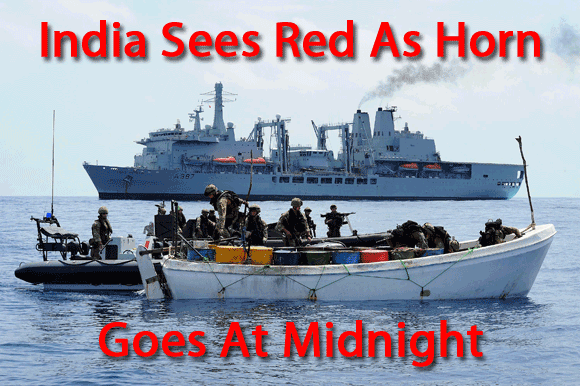 |
Air cargo forwarders in India are worried about
what is happening on the Red Sea. The disruption caused by the Red Sea
crisis will, in all probability, see carriers raising airfreight rates
any day. And that, at this moment, would spell challenges not only for
forwarders and exporters but also the air cargo sector in the country.
Yemen’s Iran-backed Houthi militants
have been attacking vessels moving through the Red Sea. In fact, Indian
Navy ships have been stationed in the region to ward off attacks. Even
so, the crisis has not only seen a huge boost in container shipping rates,
it has also forced exporters to cut down and even hold back on shipments.
According to New Delhi-based thinktank Research and Information System
for Developing Countries, India could well see a loss of USD$30 bn from
its total exports in the current fiscal year. The study by the thinktank
points to a  a
6.7% drop in Indian exports, based on last fiscal year’s $451 bn
total. Ajay Sahai, (right) Director General of the Federation
of Indian Export Organizations (FIEO), has gone on record to say, that
“in many cases, both buyers and exporters are also renegotiating
contracts to adjust to surging freight charges”. Today, a 40-foot
container from Asia to northern Europe costs around $4,000, a 173% jump
from just before the diversions started in mid-December, according to
Freightos.com, and rates from Asia to North America’s East Coast
have risen 55% to $3,900 for a 40-foot container. a
6.7% drop in Indian exports, based on last fiscal year’s $451 bn
total. Ajay Sahai, (right) Director General of the Federation
of Indian Export Organizations (FIEO), has gone on record to say, that
“in many cases, both buyers and exporters are also renegotiating
contracts to adjust to surging freight charges”. Today, a 40-foot
container from Asia to northern Europe costs around $4,000, a 173% jump
from just before the diversions started in mid-December, according to
Freightos.com, and rates from Asia to North America’s East Coast
have risen 55% to $3,900 for a 40-foot container.
The crisis has prompted the government to
constitute a high-level committee to study and identify alternative trade
opportunities from markets remaining largely untouched by the Red Sea
problems.
 Though the Red Sea problem has not had any
effect yet, Indian forwarders are readying themselves for rising freight
rates. Shesh Kulkarni, (left) Managing Director, Noatum Logistics
– India (Noatum Logistics is a leading supply chain management company
with global coverage) pointed out that while the tonnages of air freight
from India has not yet started going up with shippers shifting to air
from sea, “it is important to see this in a larger perspective.
Europe has just about started to open post-Christmas and New Year holidays.
The volumes will start showing moving only in the latter part of February,
as many of the retail stores have built inventory and their stock for
January.”
Though the Red Sea problem has not had any
effect yet, Indian forwarders are readying themselves for rising freight
rates. Shesh Kulkarni, (left) Managing Director, Noatum Logistics
– India (Noatum Logistics is a leading supply chain management company
with global coverage) pointed out that while the tonnages of air freight
from India has not yet started going up with shippers shifting to air
from sea, “it is important to see this in a larger perspective.
Europe has just about started to open post-Christmas and New Year holidays.
The volumes will start showing moving only in the latter part of February,
as many of the retail stores have built inventory and their stock for
January.”
Keku Bomi Gazder, Managing Director &
CEO, Aviapro  Logistic
Services Pvt. Ltd., said: “The disturbance in Red Sea maritime traffic
hasn’t yet had a significant impact on air cargo, as indicated by
the latest data from the TAC Index. Despite a notable decrease during
the Christmas to New Year period as the peak season concluded, the overall
Baltic Air Freight Index experienced an additional 6.6% drop in the week
ending January 8, resulting in a 31.8% decline over the past 12 months.” Logistic
Services Pvt. Ltd., said: “The disturbance in Red Sea maritime traffic
hasn’t yet had a significant impact on air cargo, as indicated by
the latest data from the TAC Index. Despite a notable decrease during
the Christmas to New Year period as the peak season concluded, the overall
Baltic Air Freight Index experienced an additional 6.6% drop in the week
ending January 8, resulting in a 31.8% decline over the past 12 months.”
Gazder went on to say that “the conflict,
meanwhile, has created an opportunity for increased air cargo charter
business as shippers and forwarders have looked at securing alternative
transport for at-risk shipments.”
Shesh Kulkarni was, however, quick to caution
that if the Red Sea crisis continues, “the problems will be multi-fold.”
He detailed them saying that the transit time by sea to Europe will go
up leading to a rise in ocean freight rates. Consequently, “the
demand for air freight increases will impact both the capacity and freight
rates.” The picture, he said, “will be a lot clearer in the
latter half of February. But for now, everybody is waiting—with
caution”.
Gazder cautioned that the ‘Red Sea
problem’ could have significant implications for air cargo operations,
affecting security measures, logistics planning, trade routes, and overall
business confidence. He said, “Air cargo plays a critical role in
maintaining the efficiency of global supply chains. Any disruptions in
the Red Sea region could have a cascading effect on supply chains, impacting
the timely delivery of goods. This could lead to increased costs for inventory
management, affecting businesses that rely on just-in-time supply chain
practices.”
He also added that geopolitical tensions
in the Red Sea region could well lead to heightened security measures
at airports, affecting air cargo operations. Stricter security protocols
could result in longer processing times, increased paperwork, and additional
costs for compliance, impacting the overall efficiency of air cargo transportation.
Additionally, security concerns or conflicts
in the Red Sea area may prompt airlines to reroute flights or avoid certain
airspace and airports. Air cargo, being an integral part of global supply
chains, may experience disruptions, affecting the timely movement of goods
and potentially leading to increased costs for businesses.
 Tushar
Jani, Group Chairman, Cargo Service Center which operates cargo terminals
in Delhi, Mumbai, Ahmedabad and Chennai, speaking to FT, said that the
Red Sea problems could see a small growth in air cargo. “The current
trouble in the Red Sea,” he said, “will increase air cargo
volume.” But, he pointed out, that “if the airlines increase
freight rates (at this time), then it will become counterproductive.” Tushar
Jani, Group Chairman, Cargo Service Center which operates cargo terminals
in Delhi, Mumbai, Ahmedabad and Chennai, speaking to FT, said that the
Red Sea problems could see a small growth in air cargo. “The current
trouble in the Red Sea,” he said, “will increase air cargo
volume.” But, he pointed out, that “if the airlines increase
freight rates (at this time), then it will become counterproductive.”
An avid supporter and an active proponent
of the development of India’s air cargo sector, Jani said that “the
industry must work towards maintaining a reasonable rate to achieve good
growth. This will enable the supply chain to remain more productive and
stable.”
He went on to say that “in 2023, India
had witnessed marginal growth with the increase of air cargo throughput
of 6.5 MMT. However, the growth has not been significant due to the recession
in Europe and a slowdown in the U.S. -- both the European Union and the
US are India's major trade partners. Indian imports from China have reduced
by about 18 percent. India's exports to Africa have also reduced slightly.
Overall, this impacted the growth of air cargo throughput.”
Tirthankar Ghosh |





